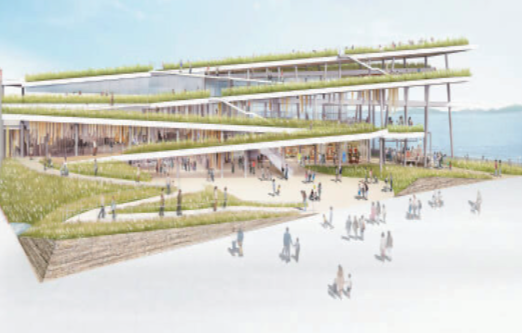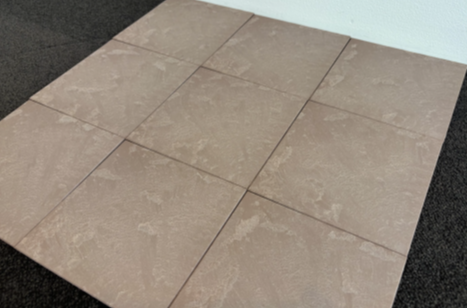Artist’s impression of the EXPO National Day Hall exterior
(Image courtesy of the Japan Association for the 2025 World Exposition)
2024.10.30
Mitsui Chemicals, Inc.
Prime Polymer
Mitsui Chemicals, Inc. (Tokyo: 4183; President & CEO: HASHIMOTO Osamu) today announced the development of a new bio-based building material in partnership with Prime Polymer Co., Ltd. (Chuo-ku, Tokyo; President: YOSHIZUMI Fumio) and hide kasuga 1896 Co., Ltd. (Minato-ku, Tokyo; President: KASUGA Hideyuki). The three partners have created floor tiles made of Transwood™ with Prasus™ – a fully bio-based composite that combines a cellulose microfiber compound with Prasus™, a mass-balanced bio-polypropylene resin produced by Prime Polymer.
The new building material was selected for use in the flooring of an event facility for Expo 2025 Osaka, Kansai, Japan (Expo 2025): the EXPO National Day Hall, which has been designed by Akihisa Hirata Architecture Office, among others. Accordingly, Mitsui Chemicals has decided to provide sponsorship for Expo 2025 in the form of supplying the 20,000 floor tiles – each measuring 15 centimeters square – required for the facility.
In providing these biomass-based floor tiles, Mitsui Chemicals aims to express its endorsement of the theme of Expo 2025, “Designing Future Society for Our Lives,” and help to ensure that the event demonstrates consideration for the achievement of carbon neutrality and a circular economy.

Artist’s impression of the EXPO National Day Hall exterior
(Image courtesy of the Japan Association for the 2025 World Exposition)

Floor tiles made of Transwood™ with Prasus™
The Ministry of the Environment’s Roadmap for Bioplastics Introduction defines the mass balance approach as “A method in which, during the process of turning raw materials into final products and the distribution process (chain of custody), raw materials with certain properties (e.g., bio-based raw materials) are mixed with raw materials that do not have the properties (e.g., fossil-based raw materials); thus, the properties are assigned to a portion of the product according to the amount of input of the raw materials with those properties.”
The physical properties of plastics and chemical products made under the mass balance method do not differ from their fossil-derived counterparts. The mass balance method also allows for the use of biomass in the production of materials where it has traditionally been difficult. Therefore, the mass balance method is a significant means of increasing the adoption of biomass in society and realizing a carbon neutral society. As of October 2024, around 40 products across the Mitsui Chemicals Group have already switched to the use of biomass resources based on the mass balance approach. Mass balance also has a crucial role to play in chemical recycling, which is set to be rolled out as a recycling solution that will pave the way for a circular economy.


Under BePLAYER™, we will help the transition to bio-based society to solve the problem of climate change. We will further the development of bio-based products via the mass balance and segregation methods alike, along with other products and technologies contributing to carbon neutrality, in an effort to substantially assist in reducing society’s greenhouse gas emissions.

Prasus™ is the brand name for Prime Polymer’s eco-friendly and sustainable polyethylene and polypropylene products made with a new feedstock based on the mass balance approach.